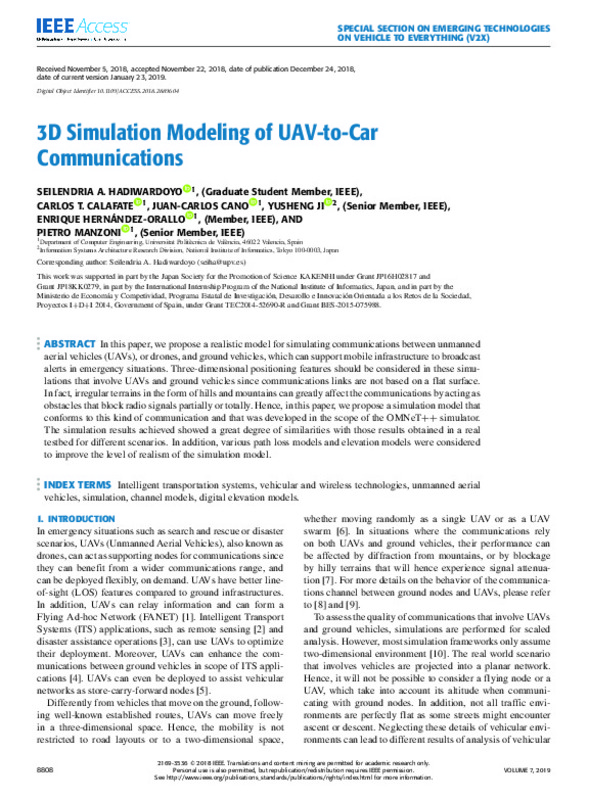JavaScript is disabled for your browser. Some features of this site may not work without it.
Buscar en RiuNet
Listar
Mi cuenta
Estadísticas
Ayuda RiuNet
Admin. UPV
3D Simulation Modeling of UAV-to-Car Communications
Mostrar el registro sencillo del ítem
Ficheros en el ítem
| dc.contributor.author | HADIWARDOYO, SEILENDRIA ARDITYARAMA
|
es_ES |
| dc.contributor.author | Tavares De Araujo Cesariny Calafate, Carlos Miguel
|
es_ES |
| dc.contributor.author | Cano, Juan-Carlos
|
es_ES |
| dc.contributor.author | Ji, Yusheng
|
es_ES |
| dc.contributor.author | Hernández-Orallo, Enrique
|
es_ES |
| dc.contributor.author | Manzoni, Pietro
|
es_ES |
| dc.date.accessioned | 2020-05-05T06:18:35Z | |
| dc.date.available | 2020-05-05T06:18:35Z | |
| dc.date.issued | 2019-01-23 | es_ES |
| dc.identifier.uri | http://hdl.handle.net/10251/142277 | |
| dc.description | (c) 2019 IEEE. Personal use of this material is permitted. Permission from IEEE must be obtained for all other users, including reprinting/ republishing this material for advertising or promotional purposes, creating new collective works for resale or redistribution to servers or lists, or reuse of any copyrighted components of this work in other works. | es_ES |
| dc.description.abstract | [EN] In this paper, we propose a realistic model for simulating communications between unmanned aerial vehicles (UAVs), or drones, and ground vehicles, which can support mobile infrastructure to broadcast alerts in emergency situations. Three-dimensional positioning features should be considered in these simulations that involve UAVs and ground vehicles since communications links are not based on a flat surface. In fact, irregular terrains in the form of hills and mountains can greatly affect the communications by acting as obstacles that block radio signals partially or totally. Hence, in this paper, we propose a simulation model that conforms to this kind of communication and that was developed in the scope of the OMNeT++ simulator. The simulation results achieved showed a great degree of similarities with those results obtained in a real testbed for different scenarios. In addition, various path loss models and elevation models were considered to improve the level of realism of the simulation model. | es_ES |
| dc.description.sponsorship | This work was supported in part by the Japan Society for the Promotion of Science KAKENHI under Grant JP16H02817 and Grant JP18KK0279, in part by the International Internship Program of the National Institute of Informatics, Japan, and in part by the Ministerio de Economía y Competividad, Programa Estatal de Investigación, Desarollo e Innovación Orientada a los Retos de la Sociedad, Proyectos ICDCI 2014, Government of Spain, under Grant TEC2014-52690-R and Grant BES-2015-075988. | es_ES |
| dc.language | Inglés | es_ES |
| dc.publisher | Institute of Electrical and Electronics Engineers | es_ES |
| dc.relation.ispartof | IEEE Access | es_ES |
| dc.rights | Reserva de todos los derechos | es_ES |
| dc.subject | Intelligent transportation systems | es_ES |
| dc.subject | Vehicular and wireless technologies | es_ES |
| dc.subject | Unmanned aerial vehicles | es_ES |
| dc.subject | Simulation | es_ES |
| dc.subject | Channel models | es_ES |
| dc.subject | Digital elevation models | es_ES |
| dc.subject.classification | ARQUITECTURA Y TECNOLOGIA DE COMPUTADORES | es_ES |
| dc.title | 3D Simulation Modeling of UAV-to-Car Communications | es_ES |
| dc.type | Artículo | es_ES |
| dc.identifier.doi | 10.1109/ACCESS.2018.2889604 | es_ES |
| dc.relation.projectID | info:eu-repo/grantAgreement/JSPS//JP16H02817/ | es_ES |
| dc.relation.projectID | info:eu-repo/grantAgreement/JSPS//JP18KK0279/ | es_ES |
| dc.relation.projectID | info:eu-repo/grantAgreement/MINECO//TEC2014-52690-R/ES/INTEGRACION DEL SMARTPHONE Y EL VEHICULO PARA CONECTAR CONDUCTORES, SENSORES Y ENTORNO A TRAVES DE UNA ARQUITECTURA DE SERVICIOS FUNCIONALES/ | es_ES |
| dc.relation.projectID | info:eu-repo/grantAgreement/MINECO//BES-2015-075988/ES/BES-2015-075988/ | es_ES |
| dc.relation.projectID | info:eu-repo/grantAgreement/AEI/Plan Estatal de Investigación Científica y Técnica y de Innovación 2017-2020/RTI2018-096384-B-I00/ES/SOLUCIONES PARA UNA GESTION EFICIENTE DEL TRAFICO VEHICULAR BASADAS EN SISTEMAS Y SERVICIOS EN RED/ | es_ES |
| dc.rights.accessRights | Abierto | es_ES |
| dc.contributor.affiliation | Universitat Politècnica de València. Departamento de Informática de Sistemas y Computadores - Departament d'Informàtica de Sistemes i Computadors | es_ES |
| dc.description.bibliographicCitation | Hadiwardoyo, SA.; Tavares De Araujo Cesariny Calafate, CM.; Cano, J.; Ji, Y.; Hernández-Orallo, E.; Manzoni, P. (2019). 3D Simulation Modeling of UAV-to-Car Communications. IEEE Access. 7:8808-8823. https://doi.org/10.1109/ACCESS.2018.2889604 | es_ES |
| dc.description.accrualMethod | S | es_ES |
| dc.relation.publisherversion | https://doi.org/10.1109/ACCESS.2018.2889604 | es_ES |
| dc.description.upvformatpinicio | 8808 | es_ES |
| dc.description.upvformatpfin | 8823 | es_ES |
| dc.type.version | info:eu-repo/semantics/publishedVersion | es_ES |
| dc.description.volume | 7 | es_ES |
| dc.identifier.eissn | 2169-3536 | es_ES |
| dc.relation.pasarela | S\376738 | es_ES |
| dc.contributor.funder | Agencia Estatal de Investigación | es_ES |
| dc.contributor.funder | Ministerio de Economía y Empresa | es_ES |
| dc.contributor.funder | National Institute of Informatics, Japón | es_ES |
| dc.contributor.funder | Japan Society for the Promotion of Science | es_ES |








